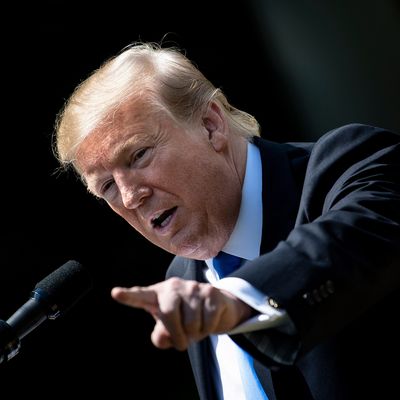
Until recently, the debate among Democrats over impeachment was mostly a straightforward argument about the 2020 fallout over taking this drastic step to deal with a drastically dangerous president. Few impeachment supporters were under the illusion that the process would actually lead to the removal of Trump from office by the requisite two-thirds vote in a Republican-controlled Senate. But some thought impeachment might dramatize Trump’s misconduct and energize Democratic voters. Others, notably Speaker Nancy Pelosi and House Judiciary Committee chairman Jerrold Nadler, disagreed, fearing that a doomed impeachment effort would take Democrats far off message in 2020 while psyching Trump supporters out of their skulls.
The release of the redacted Mueller report, with its abundant evidence of presidential obstruction of justice, didn’t change many minds among Democratic impeachment opponents, who may have concluded (as presidential candidate Pete Buttigieg put it) that Trump deserved impeachment, but still deemed it a politically dubious course of action this close to an election year.
But Mueller’s clear indication that impeachment would be the only way to hold Trump accountable for his conduct provided another strong talking point for moving in that direction: that politics be damned, it was House Democrats’ constitutional responsibility to rein in this lawless president. This was the position, for example, of another 2020 presidential candidate, Elizabeth Warren.
And now, as the Trump administration clearly signals its determination to stonewall the House by refusing to cooperate with investigations, release documents, or allow official testimony, there’s a new argument for impeachment making the rounds: It’s the only way to prevail in the inevitable legal fights between Trump and Congress over evidence of presidential misconduct, as Darren Samuelsohn and Josh Gerstein noted at Politico:
Judges have repeatedly ruled that Congress has a greater claim to sensitive government documents and personal information when it can point to an ongoing legal matter, instead of just a congressional investigation or legislative debate. And impeachment would give lawmakers that legal matter — the process is essentially a court procedure run by Congress where the House brings charges and the Senate holds the trial …
[L]egal experts and lawmakers across the ideological spectrum acknowledge that formally unleashing impeachment would bolster Democrats’ arguments that they deserve to see the president’s tax returns, interview senior officials, peruse special counsel Robert Mueller’s trove of evidence and see the details of Trump’s personal dealings with foreign leaders.
Indeed, impeachment might not only “trump” executive privilege in a court review of congressional subpoenas, but could also gives courts a solid reason to speed up hearings and appeals on the subject, much as the U.S. Supreme Court did in United States v. Nixon, the unanimous decision forcing that president to release tapes which included the famous “smoking gun” evidence of obstruction of justice. In that case, SCOTUS ruled just three weeks after oral argument subsequent to an expedited appeal from a district court.
The question of timing is becoming central to Democrats’ dilemma. If their efforts to investigate Trump get perpetually snarled in the courts, the whole conflict could drag beyond the 2020 elections. And the political risks of impeachment may grow higher by the day as well. Many Democrats think Hillary Clinton erred grievously in 2016 by campaigning against Trump’s character and ethics rather than promoting her own agenda for addressing the concerns the GOP demagogue was exploiting. Nothing would quite keep campaign 2020 more focused on Trump’s character and ethics than ongoing impeachment proceedings.
Public opinion offers no clear prescription. Around the time the Mueller report was released, pro-impeachment sentiment among Americans generally and Democrats specifically had been waning for a good while. Now there’s at least one new poll showing support for impeachment rising again among both Democrats and independents.
If, as Pelosi publicly suggests, Trump is “goading” Democrats into impeaching him, he may ultimately get his way as the House finds itself boxed out of any other approach. Already attitudes are hardening among House Democrats, as Jonathan Allen reports:
“There’s a deep concern, particularly among institutionalists, about the balance of power,” said a senior aide to one moderate Democrat who noted that the administration’s refusal to comply with subpoenas has angered some lawmakers who had been reluctant to escalate the fight.
That is, the pace is speeding up even for most Democrats who have been reluctant to go down a path that could lead to impeachment.
Should they become convinced that impeachment will give them the hammer to bust open Trump’s lockbox of potentially fatal secrets, pressure for impeachment could finally overcome 2020 fears. Democrats may conclude that beating Trump in the court of public opinion requires a step down a very uncertain path.






























